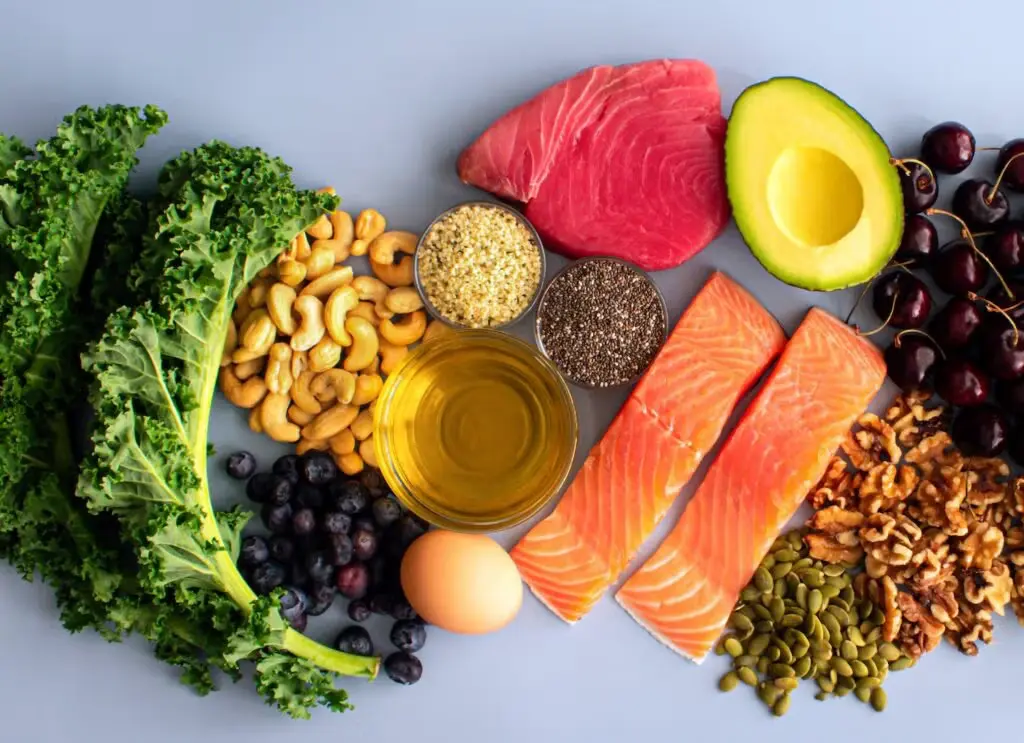Estrogen shifts in perimenopause and menopause impact weight, metabolism, and bone health, making diet crucial. A balanced menopause diet should include protein, fiber, calcium, vitamin D, and omega-3s while limiting processed foods and sugars.
Soy, flax, legumes, eggs, fruits, and vegetables support hormone balance, bones, and overall resilience. Meal planning, exercise, and mindful nutrition help manage symptoms, weight, and long-term risks like heart disease and osteoporosis.
A smart focus on perimenopause diet and nutrition can support energy, clear thinking, and long-term health. SensIQ, guided by Dr. Luke Barr, offers evidence-informed guidance to help women navigate this stage of life with confidence.
Key Takeaways
- Estrogen changes during perimenopause and menopause affect metabolism, body weight, and bone health, making diet choices especially important during this stage of life.
- A balanced diet for menopause should emphasize protein, fiber, calcium, vitamin D, and omega-3 fatty acids while limiting processed food, saturated fats, and sugary drinks.
- Foods such as soy, flax, legumes, eggs, and plenty of fruits and vegetables provide valuable nutrients that support hormone levels, bone health, and long-term resilience.
- Practical strategies, such as structured meal plans, recipe ideas, and combining diet with exercise, can help with weight loss and daily symptom management.
- Nutrition also plays a role in reducing long-term risks, including cardiovascular disease, diabetes, and bone loss, making dietary changes a key investment in future health.
Best Diet for Perimenopause
What Is the Best Diet for a Perimenopausal Woman?
The best diet for menopause and perimenopause is not one strict plan. It is a way of eating built on whole foods, lean proteins, and steady energy sources. A Mediterranean-style diet rich in fruits and vegetables, whole grains, and healthy fats may support heart and metabolic health¹.
Best Diet for Perimenopause Belly Fat
Body weight often shifts as estrogen levels drop. Eating more protein, controlling portion sizes, and reducing refined carbohydrates may help with weight loss². Adding omega-3 fatty acids from fish, flax, or walnuts can also support fullness and balance.
Perimenopause Foods to Avoid
Some foods and drinks can exacerbate symptoms. Processed food high in saturated fats, sugar, or salt can increase the risk for heart disease and unstable blood sugar. Limiting spicy foods, caffeine, and alcohol may reduce hot flashes and poor sleep³.
How Estrogen Changes Affect Health
During perimenopause and menopause, estrogen levels decline in a steady but uneven pattern. This change affects metabolism, making it easier to gain body weight and harder to lose it.
Lower estrogen levels can also reduce bone density, increasing the risk of bone loss, and may impact cardiovascular health¹. Diet choices during this stage of life can help offset some of these effects.
Balanced Diet for Menopause: Key Nutrients and Vitamins

Protein, Fiber, Calcium, and Vitamin D
Protein protects muscle in menopausal women. Fiber supports digestion and helps control blood sugar. Calcium and vitamin D are important for bone health and lower the risk of bone loss⁴. These nutrients give energy and strength during this stage of life.
Omega-3s and an Anti-Inflammatory Diet for Perimenopause
An anti-inflammatory diet for perimenopause includes omega-3 fatty acids, colorful vegetables, nuts, and seeds. These foods include compounds that may help hormone levels and brain function⁵. Regular use protects against stress and inflammation.
Phytoestrogens (Soy, Flax, Legumes)
Phytoestrogens are plant compounds that act a little like estrogen. Foods such as soy, flax, and legumes may support hot flashes and cholesterol⁶. They are safe, nutrient-rich, and easy to add to meals.
Are Eggs Good to Eat in Perimenopause?
Yes, eggs are a strong source of protein, vitamins, and minerals. They also provide choline, which supports the brain. In moderation, eggs are part of a balanced diet for menopause⁷.
Vitamins and minerals for Hormonal Support
Vitamins and minerals play key roles in this stage of life. B vitamins help with energy. Magnesium may support sleep and muscle function. You can explore safe options in our guide to women’s supplements to see which nutrients may be helpful.
Holistic Lifestyle and Exercise
Nutrition and Hormonal Balance
Diet during menopause affects hormone levels and symptoms. Whole grains and proteins can steady blood sugar and reduce mood swings. Balanced meals give the body what it needs to adapt⁸, and strategies to balance hormones in perimenopause may also provide additional support.
Perimenopause Diet and Exercise Tips
Exercise and nutrition work best together. Weight-bearing exercise helps bone health. Aerobic activity supports the heart and controls body weight. Both improve mood and energy.
Mind-Body Practices and Stress Reduction
Stress makes symptoms worse. Yoga, meditation, or simple breathing can lower stress hormones. Adding these to the diet helps create a more balanced approach.
Practical Meal Guidance

Diet Plan for Perimenopause Weight Loss
A simple plan includes protein, complex carbs, and vegetables at each meal. This supports weight loss and helps maintain steady energy levels. Small, regular meals often work better than large portions.
A sustainable meal plan emphasizes steady blood sugar and portion control. Meals may pair lean protein with complex carbohydrates and plenty of vegetables. Adding support from supplements like Creatine Clarity may also help with daily energy needs*.
Perimenopause Recipes and Meal Ideas
Easy recipes make eating well simple:
- Breakfast: Greek yogurt with flax and berries
- Lunch: Quinoa salad with vegetables and chickpeas
- Dinner: Salmon with greens and brown rice
Sample One-Day Diet Plan
- Breakfast: Eggs with spinach and whole-grain toast
- Lunch: Lentil soup with salad
- Snack: Apple with almond butter
- Dinner: Chicken with roasted vegetables and quinoa
Safety and When to See a Doctor
Supplement Use and Medical Guidance
Supplements can help, but should not replace food. Omega-3 fatty acids, calcium, or vitamin D may be useful if advised. Always ask a doctor before starting supplements.
Red-Flag Symptoms to Discuss with a Clinician
See a doctor if you have major bone loss, heavy bleeding, or strong mood changes. A healthcare provider can review risks and guide safe treatment.
Can I Lose Weight in Perimenopause?
Yes. Balanced meals, portion control, and exercise help manage body weight. Progress may be slower, but it is possible.
Do I Need to Cut Carbs?
No. Whole grains and fiber-rich carbs are good for energy. Limit processed food high in sugar instead.
Is Soy Safe?
Yes, for most women, soy is safe. It may support hormone balance. Ask your doctor if you have health concerns.
Find Your Formula – Take the Free Quiz Now with SensIQ to discover a personal nutrition and lifestyle plan for clarity and calm.
References
- Harvard Health Publishing. (2021, June 15). Why am I gaining belly fat during menopause? Harvard Health. https://www.health.harvard.edu/womens-health/why-am-i-gaining-belly-fat-during-menopause
- Mayo Clinic Staff. (2023, May 10). Hot flashes: Symptoms & causes. Mayo Clinic. https://www.mayoclinic.org/diseases-conditions/hot-flashes/symptoms-causes/syc-20352790
- Harvard Health Publishing. (2019, July 11). Quick-start guide to an anti-inflammation diet. Harvard Health. https://www.health.harvard.edu/staying-healthy/quick-start-guide-to-an-antiinflammation-diet
- Harvard Health Publishing. (2020, November 16). Foods that fight inflammation. Harvard Health. https://www.health.harvard.edu/staying-healthy/foods-that-fight-inflammation
- National Institutes of Health, Office of Dietary Supplements. (2022, March 24). Calcium: Fact sheet for health professionals. National Institutes of Health. https://ods.od.nih.gov/factsheets/Calcium-HealthProfessional/
- National Institutes of Health, Office of Dietary Supplements. (2022, March 24). Vitamin D: Fact sheet for health professionals. National Institutes of Health. https://ods.od.nih.gov/factsheets/VitaminD-HealthProfessional/
- Cleveland Clinic Health Essentials. (2023, May 24). Menopause diet: What to eat to help manage symptoms. Cleveland Clinic. https://health.clevelandclinic.org/menopause-diet
- Zhao, Y., Chen, J., & Mao, L. (2019). The golden egg: Nutritional value, bioactivities, and major bioactive compounds. Food Science and Human Wellness, 8(2), 196–201. https://pmc.ncbi.nlm.nih.gov/articles/PMC6470839/
*These statements have not been evaluated by the Food and Drug Administration. This product is not intended to diagnose, treat, cure, or prevent any disease.


